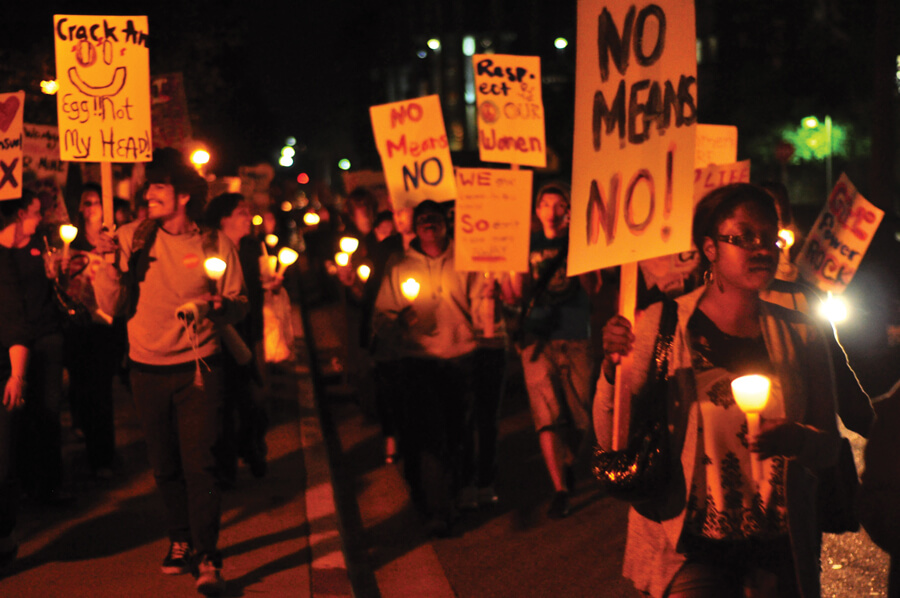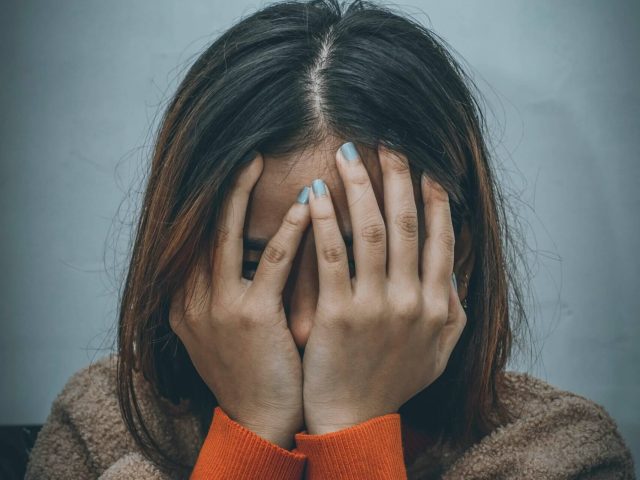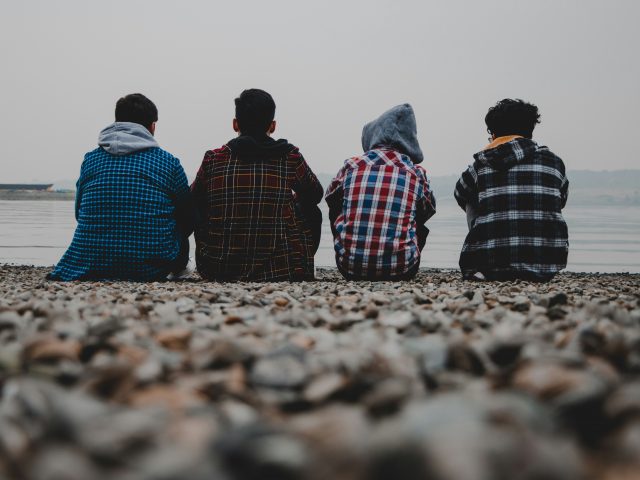![]() Written by Writer’s Corps member Kerry Mallett
Written by Writer’s Corps member Kerry Mallett
In my first six weeks of college, I sat at Take Back the Night and acutely felt for the people who spoke in front of the crowd about their experiences in abusive relationships. I could not imagine enduring what they spoke of, but I also naively thought to myself, “This wouldn’t happen to me. . . I would recognize I didn’t deserve that kind of treatment and leave.”
Little did I know, before graduating college, I would also experience an abusive relationship like those brave people that spoke that night, and I would not recognize the behaviors that were harmful or problematic for a long time. I have since graduated, but see similar behaviors and scenarios with the students I work closely with as a graduate student working in student affairs.
While every relationship is different, I now know the five behaviors below were key signs that my relationship was not a healthy one.
1. Every aspect of my behavior was scrutinized and criticized.
From singing along to the radio in the car instead of making conversation or checking my phone when it buzzed while we Skyped, I was constantly under watch and had to completely devote my attention to my significant other, despite the fact that we saw each other several times a day. If I did not, my love for them was called into question.
2. I was yelled at every day.
When the relationship started to turn more aggressive, my significant other initiated a fight with me every day for a month (after that, I stopped keeping track). The fights usually were centered around the fact that I didn’t spend enough time with him and that I wasn’t being a “good enough” girlfriend; despite the fact that we saw each other throughout the day and I stayed at his place nearly every night. I didn’t know it at the time, but I struggled with chronic anxiety, and the constant fighting gave me stomach aches either about the current fight or in anticipation of the next.
The constant stress and anxiety impacted me beyond the relationship and into the classroom. I found it hard to concentrate, and when I explained this to my significant other the effect the fighting was having on me physically, I was told it wouldn’t happen if I was a better girlfriend. Eventually, it became hard to eat because I was so anxious all of the time and I lost weight far more quickly than is healthy. Yet eating very little felt like one of the only things I could control, so while I recognized this was not healthy for me, I didn’t have the ability to change my behavior.
3. My significant other was always there.
My significant other knew my schedule and would show up outside my classes even when I had just a 20-minute break. If I explained to him that I wanted to use that free time to focus on school work or respond to emails, he would get angry with me. He showed up out-of-the-blue to countless study sessions with friends, group project meetings, and organization meetings when he needed to see me or wanted to talk; despite me explaining that it was not a good time. One time when he was mad at me, he showed up to my residence hall and sat outside until I let him in, calling me twenty times in a row in the meantime. The barrage of phone calls and texts would happen often, especially when he wanted to continue a fight. Sometimes I would just turn my phone off because I couldn’t handle it, all the while fearing the angry and threatening text messages and voicemails that would be waiting for me on the other side.
4. Everything about me was degraded and belittled.
On a nearly daily basis, I was degraded and belittled. I was told how terrible my friends were and how I shouldn’t hang out with them, that my major was a joke and I would never get a job in my chosen career path, and that I did not deserve the leadership positions I had earned. This was exacerbated by deeper put-downs that targeted my personal insecurities. Each insult would be followed by, “I tell you this because I love you,” or, “I just want the best for you and want to challenge you to make you better.” At first, I would ignore his put-downs and justify why that aspect of me mattered. But over time, feelings of isolation and worthlessness took over and I developed and began living a self-loathing mentality.
5. I began to feel like a burden on others.
The constant berating and psychological manipulation eventually caused me to start thinking about how much of a burden I was on my friends, family, and boyfriend, and how their lives would be easier if I was not in this world. These thoughts were a result of the loneliness and worthlessness I was feeling at the time and were not feelings that stayed after our relationship ended. One morning before going to class, I looked in the mirror and thought to myself, “I feel dead inside.” I felt cold and hollow to the core, and while I could recognize my desperation, I couldn’t imagine a way where I could help myself. Thankfully my busy day ahead of me didn’t allow me the time to dwell on these feelings. It took years for me to realize that the thoughts I was having in that moment were suicidal in nature and would have an impact on my mental health even months after our relationship ended.
Thankfully I ended that relationship and slowly rebuilt my sense of self-worth. Coming full circle, during my senior year I spoke at Take Back the Night about my experience and how I had been so naive when I was in the audience three years prior. It was the first time I spoke publicly about it, and it showed me the importance of education and speaking out about these behaviors.
I consider myself extremely lucky because I was able to get out of this unhealthy and emotionally abusive relationship. If these behaviors are familiar in your relationship or in that of someone you care about, know that these actions are never ok and no one deserves to be treated this way. By becoming educated on the signs of a healthy relationship as well as an unhealthy relationship, you can help end or prevent relationship abuse.
If you or someone you know is experiencing an unhealthy or abusive relationship, check out our real time resources, or call the National Domestic Violence Hotline at 1-800-799-7233. If you’re in imminent danger, please call 911.
Browse by Category

How To Talk To A Friend In An Unhealthy Relationship
It’s not easy to know how to talk to a friend when we’re worried they’re in an unhealthy relationship. We…
Hope After Abuse: What I Wish I Knew About Relationships In College
As a freshman in college – my first real time…
A Crash Course In Handling Rejection
The spring/summer cusp is an exciting time of year: long…
What Movie Prom Scenes Can Teach Us About Relationships
Prom season is upon us and millions of high school…
Ways We Self-Sabotage In A New Relationship After an Unhealthy One
You did it. You ended your unhealthy relationship. You grieved.…














